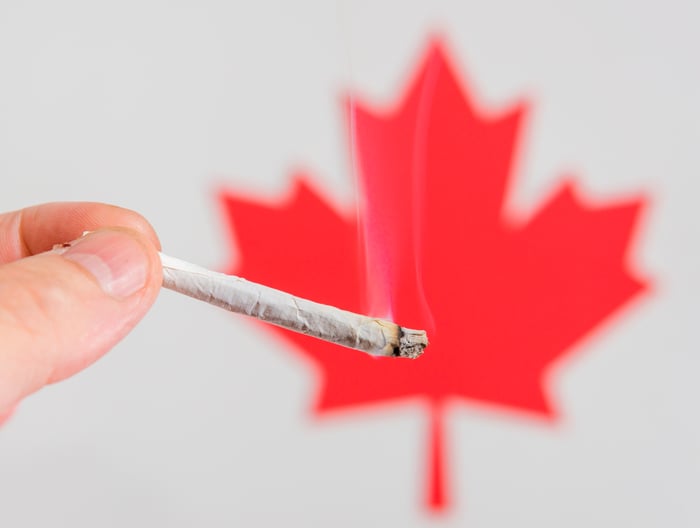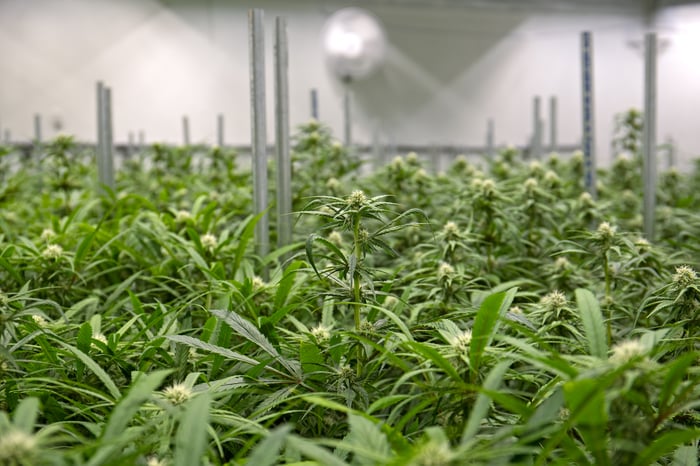The marijuana industry has been practically unstoppable over the past couple of years, which is a big reason why investors have flocked to marijuana stocks, and select state legislatures have moved to legalize cannabis as a means of generating new tax revenue.
In North America, $6.9 billion worth of medical and recreational weed was sold last year, according to ArcView Market Research, though $46.4 billion in sales remained in black market channels. By 2021, ArcView foresees legal sales jumping to north of $22 billion annually, implying the ongoing legalization of pot in various U.S. states, and perhaps north and south of the U.S. border. The potential to move current black market consumers into legal channels is the entire reason why marijuana stocks have been soaring of late.

Image source: Getty Images.
An effort to turn the maple leaf green
However, between medical cannabis and recreational weed, the Holy Grail for the industry would be a countrywide recreational approval. The market for adult-use pot is substantially larger than medical cannabis, but just one country worldwide, Uruguay, has legalized the sale of recreational marijuana. Currently, our neighbors to the north, Canada, aim to become the second.
A recently introduced bill by Prime Minister Justin Trudeau, a longtime supporter of a countrywide recreational marijuana legalization effort, is targeting July 1, 2018 as the date where recreational pot would become legal in Canada.
Per various sources, the bill would allow adults ages 21 and up to buy recreational weed, possess up to 30 grams, which is a little over an ounce, and grow up to four plants in their household at a time. Considering that no other developed nation has legalized recreational cannabis, and Canada has a well-laid foundation for its medical marijuana industry (medical cannabis was legalized 16 years ago in Canada), legalization is expected to have a real shot of passing muster in Parliament.
Canada's recreational weed bill could be in trouble
However, there's quite a bit of opposition to Canada's recreational marijuana legalization efforts, and it could wind up pushing Trudeau's legislation off the table altogether.
Though Canada's current government make-up could reasonably be described as "progressive," conservative members of Parliament could make legalization far more challenging than people and investors realize.

Image source: Getty Images.
For example, conservative members of Parliament have suggested that the bill's allowance of up to four marijuana plants in each household is an invitation for minors to get their hands on weed. Not allowing a homegrow option is an alternative, but it would also be a smack in the face to those people who want to see reins taken off cannabis completely. There may not be a simple solution that satisfies conservative members of Parliament in this respect.
Another primary issue involves how impairment for drivers behind the wheel will be measured. Though there are a handful of companies developing breathalyzer tests that can detect levels of tetrahydrocannabinol (THC), the psychoactive component of cannabis, in drivers, there are no baselines to describe what would be considered an unacceptable level of impairment. For instance, a blood alcohol content of 0.08% or higher in the U.S. is considered impaired for a driver. There aren't any guidelines for marijuana use, which makes resolving the concerns of lawmakers exceptionally challenging.
A possible double-whammy for Canadian marijuana stocks
If Canada is unable to get its recreational weed bill passed into law, Canadian marijuana stocks, which have risen considerably in anticipation of an expected legalization, could quickly lose the wind from their sails. The four, in particular, that are at greatest risk of having their valuations take a hit are Canopy Growth Corp. (CGC -10.51%), Aphria (NASDAQOTH: APHQF), Aurora Cannabis (ACB -4.85%), and MedReleaf (LEAF).

Image source: Getty Images.
MedReleaf recently went public, becoming the largest North American pot stock IPO by market value of all time, while its competition has been busy expanding grow capacity in the wake of a growing number of medical cannabis customers and the expectation of recreational legalization. Canopy Growth Corp. acquired Mettrum Health earlier this year, widening its reach within Canada, and purchased 472,000 square feet of property, which also happens to house its headquarters. Meanwhile, Aurora Cannabis is working on a state-of-the-art 800,000 square foot facility known as Aurora Sky, and Aphria has moved onto its $100 million Phase IV expansion that'll boost its grow capacity to one million square feet.
These expansion figures sound great, if Canada moves forward with its recreational pot bill. If not, even with substantive growth in the medical cannabis market, there could be oversupply issues and weaker margins as a result.
But this is far from the only problem. Health Canada also announced changes to its medical cannabis program in May that could have negative implications for the four Canadian marijuana stocks listed above. Health Canada plans to issue additional growing licenses, as well as allow existing producers to pack their vaults with supply, assuming it can be done safely and securely. In other words, it sounds as if extra competition and supply are on the verge of flooding the Canadian market. That's not good news for any of these four companies.
Long story short, Canadian marijuana stock investors may soon wind up sorely disappointed.





